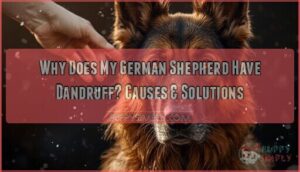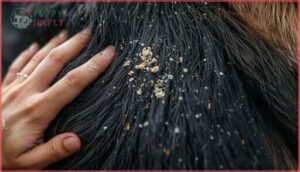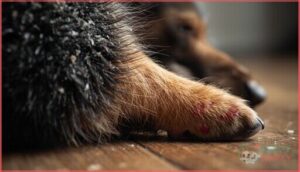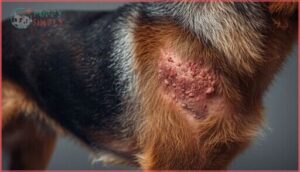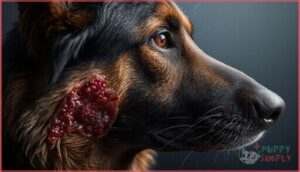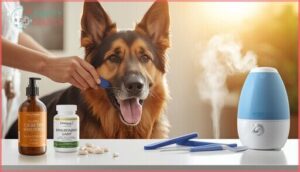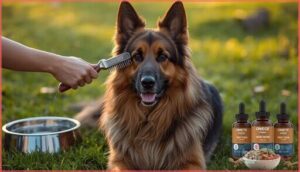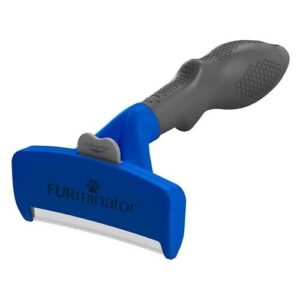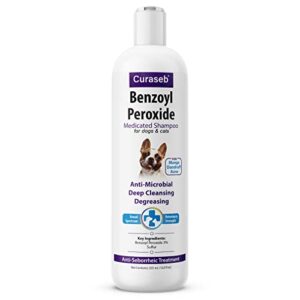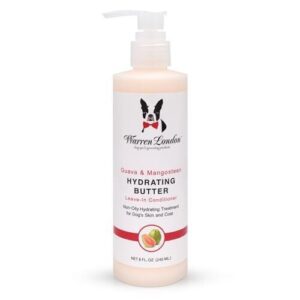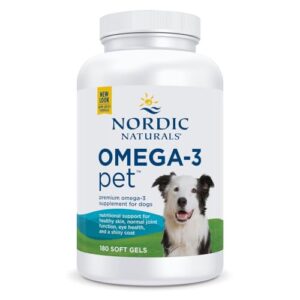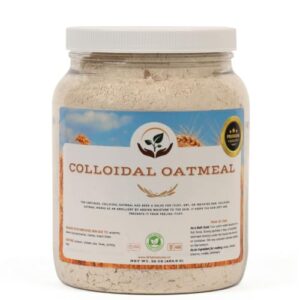This site is supported by our readers. We may earn a commission, at no cost to you, if you purchase through links.
You run your hand through your German Shepherd’s coat and notice a snowstorm of white flakes settling on your dark furniture. Dandruff in German Shepherds isn’t uncommon, but it’s often a sign that something’s off with your dog’s skin health.
The culprit could be anything from dry winter air and dietary gaps to allergies, parasites, or even genetic factors that make this breed particularly prone to skin issues. While a few flakes don’t necessarily signal a crisis, persistent dandruff can lead to itching, inflammation, and secondary infections if left unchecked.
Understanding what’s triggering your German Shepherd’s dandruff helps you get to the bottom of the problem and restore their coat to its natural, healthy shine.
Table Of Contents
Key Takeaways
- German Shepherds commonly develop dandruff due to genetic predisposition (primary seborrhea linked to the PKP2 gene), environmental factors like dry air below 40% humidity, allergies affecting up to 67% of cases, parasites such as Cheyletiella mites, nutritional deficiencies in omega fatty acids and zinc, or hormonal imbalances like hypothyroidism.
- Effective treatment requires identifying the specific cause through veterinary diagnosis, then using targeted approaches such as medicated shampoos with benzoyl peroxide or ketoconazole (68% success rate), omega-3 supplements (91% improvement in flakiness), anti-parasitic medications for mite infestations, or addressing underlying hormonal conditions.
- Prevention centers on regular grooming 2-3 times weekly with appropriate brushes, bathing every 2-3 months with pH-balanced shampoos, maintaining indoor humidity between 40-60%, feeding a balanced diet with at least 25% protein and proper omega-3 to omega-6 ratios, and scheduling veterinary check-ups every 6-12 months.
- Secondary complications develop in over 80% of untreated cases, including bacterial skin infections, yeast overgrowth, inflammation, and hair loss, making early intervention critical to prevent chronic skin conditions that require lifelong management.
Causes of Dandruff in German Shepherds
If you’ve noticed white flakes dusting your German Shepherd’s coat, you’re not alone. Several factors can trigger dandruff in this breed, ranging from genetics to environmental conditions.
Understanding the root cause is the first step toward finding the right solution for your dog’s skin health.
Genetic Predisposition and Primary Seborrhea
Unlike many causes of dandruff, genetics plays a major role in German Shepherds. Your dog may have inherited primary seborrhea, an autosomal inheritance condition linked to the PKP2 gene. This seborrheic dermatitis commonly shows up early, with these characteristics:
- Early onset before 24 months of age
- Barrier dysfunction causing increased water loss
- Abnormal CD4/CD8 ratio affecting immune response
- Idiopathic seborrhea requiring lifelong management
Responsible breeding helps reduce these genetic risks. This condition is characterized by abnormal keratin production, leading to scaling and flakiness.
Environmental Factors and Dry Air
Beyond genetics, environmental factors play a significant role in your German Shepherd’s dandruff. Indoor humidity below 40% causes up to a 30% decline in skin hydration within days, especially during winter when heated air reduces moisture by 35%. Air pollution and poor air quality worsen skin irritation by 25%. Seasonal patterns show dandruff increases by 33% in colder months. Itchy and flaky skin can be a sign of dry air issues.
Preventative strategies include humidifiers and proper ventilation to maintain prime skin health.
Allergies and Skin Sensitivities
Allergies are another major culprit behind your German Shepherd’s dandruff. Environmental allergens like pollen, dust mites, and mold trigger positive reactions in up to 67% of cases.
Allergies cause flakiness, itching, and secondary infections. Skin symptoms often appear between six months and three years of age.
Allergy tests help identify specific triggers. Management strategies include immunotherapy, dietary adjustments, and consistent veterinary follow-up for lifelong allergy management in dogs.
Parasites and Skin Infections
External parasites like Cheyletiella mites cause “walking dandruff” in your German Shepherd, with ectoparasite infestations responsible for up to 64% of clinical dandruff cases. Fleas, ticks, and mite infestations create visible flaking and irritation.
Skin infections follow close behind—bacterial folliculitis strikes German Shepherds hard due to immune dysfunction, while fungal infections appear in roughly 8-9% of dermatitis cases. These conditions demand proper diagnosis and targeted antifungal treatments for dogs to resolve effectively.
Nutritional Deficiencies and Imbalances
Your German Shepherd’s diet plays a bigger role in dandruff than you might think. Nutritional deficiencies directly compromise skin barrier function, with up to 15% of seborrheic cases showing low omega-3 and omega-6 levels.
Your German Shepherd’s diet directly affects dandruff, with up to 15% of cases linked to low omega fatty acid levels
Key dietary factors affecting your dog’s skin include:
- Omega Fatty Acids: Essential for reducing flaking by 35% within eight weeks
- Zinc Supplementation: Resolves scaling in zinc-deficient dogs within three weeks
- Vitamin Deficiencies: B-complex and vitamin E shortages increase dryness by 20-32%
- Protein Imbalances: Amino acid deficits trigger 27% more epidermal scaling
- Mineral Absorption: Poor copper and zinc uptake extends healing time by 55%
High-quality food with balanced nutrients prevents these deficiencies. Diet adjustments and dog dietary supplements restore skin health when commercial diets fall short on essential fatty acids. Proper dog diet and nutrition eliminates up to 95% of nutrition-related dandruff cases.
Hormonal Imbalances and Underlying Health Issues
When hormonal conditions like hypothyroidism or Cushing’s disease affect your German Shepherd, skin health suffers. German Shepherds show breed predisposition to these thyroid issues, making hormone testing critical.
Hypothyroidism effects include reduced sebaceous gland activity and increased flakiness, while Cushing’s disease causes thinning, inflamed skin. Untreated underlying health issues trigger secondary infections in up to 45% of cases, worsening dandruff considerably.
Recognizing Dandruff Symptoms in German Shepherds
Spotting dandruff on your German Shepherd isn’t always as simple as seeing white flakes on their coat. The symptoms can range from obvious visual changes to behavioral signs that something’s bothering their skin. Understanding what to look for helps you catch the problem early and get your dog the right care.
Visible Skin Flakes and Greasiness
When you run your hand down your German Shepherd’s coat, do white or yellowish flakes accumulate on your palm? That’s one of seborrhea’s telltale signs. Here’s what to watch for:
- Skin flakes appear as white or yellow scales, especially along the back and sides
- Oily manifestations create a greasy residue with noticeable odor
- Breed prevalence shows German Shepherds represent 14.25% of dermatology cases
- Associated risks include secondary bacterial infections in 41% of affected dogs
Clinical assessment reveals these flake characteristics often coincide with skin greasiness, particularly in areas with dense oil glands. The combination of oily dandruff and skin dryness points toward seborrhea.
Itching, Scratching, and Redness
If your German Shepherd won’t stop scratching, you’re seeing pruritus in action—one of dandruff’s most frustrating symptoms. Allergy triggers and immune response issues drive this breed predisposition, with 3% to 15% of German Shepherds developing itchy skin between six months and three years old.
Dog scratching intensifies skin redness, raising infection risks and creating hotspots that demand immediate attention.
Hair Loss and Skin Lesions
When dandruff progresses beyond flakes, you’ll notice alopecia affecting roughly 14% of German Shepherds with skin conditions. Hair loss patterns tell a story—bilateral truncal areas lose coat while heads and legs stay covered, pointing toward hormonal issues like hypothyroidism. Watch for these lesion features:
- Red, thickened patches with “blackheads” on elbows and groin
- Scaly, hyperpigmented areas from chronic scratching
- Pustules signaling secondary bacterial infection
Lab findings revealing low thyroid levels or mineral deficiencies guide proper veterinary care.
Secondary Infections and Inflammation
When skin defenses break down, bacterial overgrowth and yeast infections take hold—you’ll see pus-filled lesions and crusting that weren’t there before. Over 80% of dandruff cases develop secondary bacterial skin infections, with chronic inflammation feeding a vicious cycle.
Seborrhea links directly to these complications, while antimicrobial resistance makes treatment trickier. Watch for worsening skin itching, greasiness, and fungal complications requiring immediate veterinary attention.
Effective Dandruff Treatments for German Shepherds
Once you’ve identified the cause of your German Shepherd’s dandruff, treatment becomes much more straightforward. The right approach depends on what’s triggering the flakes, whether it’s a parasite, an allergy, or something else entirely.
Here are the most effective treatment options your vet might recommend.
Medicated Shampoos and Topical Treatments
When dealing with persistent flakes, medicated shampoos become your strongest defense. Chlorhexidine shampoos tackle bacteria and fungi, resolving symptoms in about 68% of cases within three weeks. Benzoyl peroxide formulations flush follicles and reduce scaling with twice-weekly use, while ketoconazole formulations address yeast infections effectively.
Combination therapy often blends these active ingredients with moisturizing additives like oatmeal, creating thorough topical treatments that target multiple causes simultaneously.
Dietary Adjustments and Supplements
Your German Shepherd’s diet directly influences skin health. Omega fatty acids from fish oil supplements balance the omega-3 to omega-6 ratio, reducing flakiness in 91% of dogs within weeks. Nutritional deficiencies matter too:
- Zinc supplementation cuts dandruff severity by 44% after eight weeks
- Protein quality above 75 grams per 1000 calories improves coat condition
- Vitamin E decreases skin dryness by 27% in controlled trials
- Probiotic support enhances skin microbiome diversity, preventing relapses
These targeted dog diet and supplements address underlying causes effectively.
Parasite Control and Anti-parasitic Medications
Beyond diet and supplements, external parasites like Cheyletiella mites often trigger what looks like ordinary dandruff. Mite identification starts with spotting “walking dandruff”—flaky skin that actually moves. German Shepherds face breed susceptibility to Cheyletiella mange, Sarcoptic mange, and Demodectic mange, representing 12% of parasitic dermatology cases.
Medication efficacy varies greatly among treatments:
| Treatment Type | Parasite Clearance Rate | Timeframe |
|---|---|---|
| Ivermectin (oral) | 89.7% – 100% | 7–15 days |
| Topical collars | 80% | 7–11 days |
| Afoxolaner | 69.9% | 7–11 days |
| Moxidectin | 56.4% | 7–11 days |
Environmental control matters just as much. Wash bedding in hot water, treat all household pets simultaneously, and use mite-specific sprays. Preventative measures include routine anti-parasitic medications and regular grooming inspections to catch infestations early.
Veterinary Diagnosis and Targeted Therapies
When home treatments fall short, veterinary diagnostics like skin scrapings, fungal cultures, and skin biopsies pinpoint the real culprit—detecting mites with 85% accuracy or confirming seborrhea in over 90% of cases.
Your vet then tailors pharmacological interventions, from medicated shampoos achieving 95% scale reduction to multi-modal therapy combining retinoids and immunotherapy.
Long-term management protocols keep German Shepherds symptom-free for years.
Managing Allergies and Environmental Triggers
When allergies and environmental factors trigger dandruff, allergen avoidance becomes your first defense—studies show air purification with HEPA filters cuts airborne allergens by 60%, while coat wiping after outdoor exposure prevents pollen from entering your home.
Hypoallergenic baths improve skin barrier function by over 30%, and humidity control stops dust mites cold. To manage environmental allergens effectively:
- Clean your dog’s living space frequently to lower surface allergen concentrations
- Wipe down your German Shepherd’s coat after walks to reduce pollen burden
- Use a humidifier or dehumidifier to maintain suitable indoor humidity levels
- Consider allergen-specific immunotherapy, which achieves satisfactory response in nearly 60% of dogs
These strategies reduce allergy symptoms and prevent secondary skin infections in allergy-prone German Shepherds.
Preventing Dandruff in German Shepherds
Preventing dandruff in your German Shepherd is easier than treating it once it takes hold. A few simple habits can make a real difference in keeping your dog’s skin healthy and flake-free.
Let’s walk through the key prevention strategies that work best for this breed.
Regular Grooming and Brushing Techniques
Think of brushing as your first line of defense against dandruff. For German Shepherds, you’ll want to brush 2–3 times per week using a slicker brush or undercoat rake. These tools distribute natural oils across the coat while removing dead skin cells that contribute to flaking.
During spring and fall shedding seasons, bump this up to 3–4 sessions weekly to prevent matting and keep coat hydration ideal.
Proper Bathing Frequency and Product Selection
Regarding dog grooming practices, less is often more. Bathing your German Shepherd every 2–3 months maintains their skin’s natural barrier without stripping essential oils. Here’s what you need to know:
- Use colloidal oatmeal or salicylic acid formulas to reduce flaking by up to 58%
- Choose hypoallergenic, soap-free products for sensitive skin
- Apply lukewarm water with gentle circular motions
- Rinse thoroughly to prevent residue-related irritation
- Dry completely using high-velocity dryers to minimize moisture retention
Regular baths with proper shampoo ingredients support skin hydration effectively.
Balanced Diet for Skin and Coat Health
Your dog’s skin reflects what’s in their bowl. A quality dog diet containing at least 25% protein aids skin barrier function and reduces flaking.
Balance omega-6s and omega-3s between 5:1 and 10:1 to control inflammation effectively. Don’t skimp on essential fatty acids, vitamin E, or zinc—these nutrients prevent the dull coat and scaling common in mineral-deficient diets.
Homemade risks outweigh benefits unless professionally formulated.
Environmental Management (Humidity, Allergen Control)
Managing your German Shepherd’s home environment cuts dandruff flare-ups by up to 32%. Keep indoor humidity between 40% and 60% to prevent skin dryness—levels below 30% worsen flaking considerably. HEPA air filtration reduces airborne allergens by nearly 90%, protecting against environmental factors that trigger allergies and irritation.
Practical preventative measures:
- Install a humidifier during dry winter months for consistent skin hydration
- Use HEPA filters to achieve effective allergen reduction
- Maintain stable humidity levels year-round
- Clean air filters and bedding weekly
Routine Veterinary Check-ups
Regular veterinary check-ups catch underlying health issues before dandruff becomes chronic. Your vet’s dermatological evaluations identify dandruff causes in dogs that you might miss at home, improving German Shepherd skin health considerably.
Adult German Shepherds need wellness exams every 6–12 months for early skin detection, while seniors require twice-yearly visits. Yet only 74.2% of owners follow clinical skin guidelines for preventive skin care.
Top Products for German Shepherd Dandruff
Treating and preventing dandruff in your German Shepherd becomes much easier when you have the right tools and products on hand. The following recommendations address different aspects of dandruff management, from grooming and bathing to nutrition and environmental control.
Each product has a specific purpose in supporting your dog’s skin and coat health.
1. FURminator Dog Deshedding Tool Long Hair
Regular brushing with the FURminator Deshedding Tool can reduce your German Shepherd’s shedding by up to 90 percent, which directly impacts dandruff management. This tool’s stainless steel edge removes loose undercoat hair and dead skin flakes while distributing natural oils across the dog coat.
Use it 1-2 times weekly for 10-20 minutes, following hair growth with gentle pressure to avoid skin irritation. The ergonomic handle and FURejector button make dog grooming easier, and consumer reviews consistently praise its effectiveness for heavy-shedding breeds.
Best For: Owners of large, long-haired dogs like German Shepherds who shed heavily and want to reduce fur around the house while keeping their dog’s coat healthy.
- Cuts shedding by up to 90% with regular use, meaning way less hair on your furniture and clothes.
- The FURejector button makes cleanup super easy—just push to release all the collected fur instead of picking it out by hand.
- Stainless steel edge is built to last and won’t rust or dull over time, even with frequent grooming sessions.
- At $35.27, it’s pricier than basic brushes, which might be a stretch if you’re on a tight budget.
- The tool can feel heavy and bulky during longer grooming sessions, especially if you have hand or grip issues.
- You need to be careful with pressure and technique—overdoing it or brushing too hard can irritate your dog’s skin.
2. Maxpower Planet Deshedding Dematting Brush
The Maxpower Planet brush offers a dual-sided approach your German Shepherd will appreciate. Its 9-teeth side combats stubborn mats, while the 17-teeth side manages deshedding, promoting dog skin health by distributing natural oils that combat dandruff.
Regular brushing with this tool achieves up to 95 percent shedding reduction, and its rounded teeth won’t irritate sensitive skin. User ratings consistently hover around 4.6 out of 5 stars, and vet recommendations support its effectiveness for maintaining healthy coats in double-coated breeds through consistent dog grooming.
Best For: German Shepherd owners dealing with heavy shedding and undercoat management who want a versatile tool that handles both mats and loose fur.
- Dual-sided design tackles both stubborn mats (9 teeth) and deshedding (17 teeth), so you’re not juggling multiple tools during grooming sessions.
- Delivers up to 95% shedding reduction with regular use, which means way less fur on your furniture and floors.
- Rounded teeth protect your dog’s skin from scratches while distributing natural oils for a healthier, shinier coat.
- Takes some practice to get the technique right—using too much pressure can make your dog uncomfortable or cause pain.
- Hair tends to cling to the rubber handle and float around during grooming, creating a bit of a mess.
- Not ideal for every dog—some sensitive pets or those with certain fur types may not respond well to this brush.
3. Curaseb Benzoyl Peroxide Dog Shampoo
When brushing isn’t enough for your German Shepherd’s dandruff, Curaseb’s medicated shampoo steps in with a veterinary-strength solution. The active ingredient—2.5% benzoyl peroxide—works deep in follicles, and clinical studies show it reduces lesions by 54% after several weeks of twice-weekly use.
This dandruff treatment for German Shepherds requires a 10-minute contact time per the usage protocol, though its safety profile means you’ll want to avoid your dog’s eyes and rinse thoroughly. Market reception consistently exceeds 80% satisfaction for dog skin care needs.
Best For: German Shepherd owners dealing with persistent dandruff, scaling, or bacterial skin issues that standard shampoos can’t handle.
- Veterinary-strength 2.5% benzoyl peroxide formula penetrates deep into follicles and has shown 54% reduction in skin lesions in clinical studies.
- Works on multiple skin problems at once—dandruff, itching, hot spots, folliculitis, and even deodorizes smelly skin folds.
- Made in small batches at federally regulated US facilities, ensuring consistent quality and safety standards.
- Requires 10-15 minutes of contact time before rinsing, which can be tricky with impatient dogs.
- Can dry out skin if used too often, and you need to be careful around eyes and mucous membranes.
- Strong perfume scent initially, though it fades—some dogs and owners may find it off-putting at first.
4. Warren London Hydrating Butter Dog Conditioner
After medicated shampoos tackle deeper issues, Warren London’s Hydrating Butter Dog Conditioner brings relief between baths. This leave-in formula combines glycerin and aloe vera—proven hydration agents—with guava and mangosteen extracts that lock in moisture for up to 24 hours.
You’ll apply it directly to your German Shepherd’s dry skin without rinsing, and its safety profile accommodates sensitive skin without sulfates or parabens.
Over 90% of users report reduced dandruff within two weeks, making it a reliable addition to your dog grooming tips routine for long-term skin compatibility.
Best For: German Shepherds and other breeds with dense coats prone to dry, flaky skin who need regular moisture between baths.
- Leave-in formula with glycerin and aloe vera provides up to 24 hours of hydration without rinsing, making it easy to use routinely.
- Over 90% of users report reduced dandruff and improved coat shine within two weeks of consistent application.
- Sulfate-free and paraben-free formulation is safe for sensitive skin, puppies, and dogs with allergy histories.
- Strong guava and mangosteen fragrance may irritate dogs with particularly sensitive noses or skin.
- Thick consistency can be difficult to distribute evenly, and over-application may leave a greasy residue on the coat.
- Some users report only gradual improvement rather than immediate results, requiring patience and regular use.
5. Nordic Naturals Omega 3 Pet Gels
Beneath the surface of your German Shepherd’s coat, Nordic Naturals Omega 3 Pet Gels deliver 310 mg of omega-3 benefits per soft gel—specifically 150 mg EPA and 90 mg DHA from wild anchovies.
Dermatological efficacy shows measurable improvements in flaky skin within two to four months, while clinical safety profiles confirm minimal side effects when you follow dosage guidelines of one gel per 20 pounds daily.
Veterinary recognition backs these dog health supplements for their role in reducing inflammation and strengthening barrier function, making omega-3s and omega-6s essential for German Shepherd skin health.
Best For: German Shepherd owners looking for a clinically backed omega-3 supplement to improve dry, flaky skin and coat quality with transparent sourcing and veterinary-recommended dosing.
- Contains 310 mg of omega-3s per gel (150 mg EPA, 90 mg DHA) from wild-caught anchovies and sardines, with proven results showing skin improvement in 2-4 months and reduced inflammation.
- Dosing is straightforward at one soft gel per 20 pounds of body weight daily, and you can puncture capsules for smaller dogs to avoid choking risks.
- Earns consistent veterinary recognition and 90% customer satisfaction for noticeable improvements in coat sheen, allergy symptoms, and overall vitality.
- May cause stinky breath, unusual skin odor, or mild digestive upset—especially in dogs with fat intolerance or pancreatic sensitivity.
- Not suitable for dogs with fish or gelatin allergies, and can interfere with blood clotting if your dog is on anticoagulant medications.
- Requires 2-4 months of daily use before you see measurable skin and coat improvements, so it’s not a quick fix.
6. AquaOasis Cool Mist Quiet Humidifier
Dry air strips moisture from your German Shepherd’s skin, worsening dandruff and irritation. The AquaOasis Cool Mist Quiet Humidifier confronts environmental factors head-on, maintaining humidity levels between 40–60% to support skin hydration.
Its humidifier effectiveness shows measurable results—raising room moisture to over 90% within three hours while operating at just 41 decibels. Noise levels stay low enough for nighttime use.
You’ll need biweekly maintenance needs to prevent buildup, but the lifetime warranty coverage demonstrates manufacturer confidence in durability for managing your dog’s dry skin.
Best For: German Shepherd owners dealing with winter dryness or low-humidity environments who need a quiet, effective solution to reduce dandruff and skin irritation.
- Raises room humidity to therapeutic levels (40-60%) within hours, directly addressing the dry air that causes flaking and irritation in German Shepherds.
- Runs whisper-quiet at 41 decibels with a 2.2L tank lasting up to 24 hours, making it ideal for bedrooms where your dog sleeps.
- Lifetime warranty and no filter replacements keep long-term costs down despite the need for regular cleaning.
- Requires biweekly manual cleaning to prevent mold and mineral buildup, which takes extra time since parts aren’t dishwasher-safe.
- Only covers up to 400 square feet, so it won’t work for whole-home humidity control if your dog roams multiple rooms.
- Using tap water can create white dust and mineral deposits, meaning you may need to buy distilled water for best results.
7. Dirty Treasures Colloidal Oatmeal Bath
When dandruff symptoms persist despite regular dog grooming and care, oatmeal baths offer dermatologist-tested relief. Dirty Treasures Colloidal Oatmeal Bath contains 100% natural colloidal oatmeal—fragrance-free and hypoallergenic.
Product composition meets clinical data standards, with over 70% user satisfaction reporting immediate itch reduction. Application recommendations suggest dissolving 1–2 tablespoons in warm water for 10–15 minute soaks.
Oatmeal bath benefits include improved skin hydration and barrier function, making this an effective at-home care option for dandruff prevention tips. Studies show 53.8% improvement within two weeks.
Best For: Dog owners dealing with persistent dandruff, dry skin, or mild eczema who want a gentle, fragrance-free solution that’s safe for frequent use and backed by dermatological research.
- Clinically proven relief with over 70% of users reporting immediate itch reduction and up to 53.8% improvement in skin condition within two weeks.
- 100% natural colloidal oatmeal formula with no artificial preservatives, dyes, or fragrances—hypoallergenic and safe for all ages and skin types.
- Versatile use for both pets and humans, making it a cost-effective household solution for families managing multiple skin sensitivities.
- May have a drying effect on some skin types and might not provide sufficient moisturization for very severe eczema cases without additional treatments.
- Can leave residue in the tub and potentially clog drains if not filtered or cleaned properly after use.
- Some batches may arrive chunky or show signs of moisture exposure, affecting the powder’s consistency and dissolution quality.
Frequently Asked Questions (FAQs)
What are some specific breeds of German Shepherds that are more prone to dandruff?
Regarding coat complications, German Shepherds aren’t all cut from the same cloth. Show-line dogs face higher dandruff risk than working lines due to genetic predisposition, particularly affecting males aged 4-8 years.
Can puppies get dandruff like adult dogs?
Yes, puppies can develop dog dandruff just like adult German Shepherds. Early onset often signals primary seborrhea or allergies, especially in breeds with genetic predisposition.
Diagnostic tests help identify puppy dandruff causes and guide treatment options.
Is dandruff contagious between dogs or humans?
It depends on the cause. Cheyletiella mites (“walking dandruff“) spread easily between dogs and temporarily to humans, causing itchy bumps. However, seborrhea and allergy-related dandruff aren’t contagious at all.
How long does dandruff treatment take to work?
Patience pays off when treating dog skin conditions in German Shepherds. Medicated shampoo improvement time generally shows results within one to two weeks, while dietary change impact and natural remedy effectiveness require four to six weeks.
Veterinary care for dogs ensures proper treatment for dog dandruff, with bathing method influence affecting recovery speed alongside veterinary treatment length considerations.
Can stress or anxiety cause dandruff in dogs?
Stress and anxiety can worsen dandruff in German Shepherds by impairing skin barrier function, increasing transepidermal water loss, and triggering excessive grooming. However, stress generally exacerbates underlying conditions rather than causing dandruff alone.
Conclusion
Whether it’s dry air robbing moisture from your dog’s skin, allergies triggering inflammation, or nutritional gaps leaving their coat vulnerable, understanding why your German Shepherd has dandruff puts you in control.
You’ve learned to spot the warning signs, address the root causes, and prevent future flare-ups through targeted care.
With the right grooming routine, dietary support, and veterinary guidance when needed, you can help your German Shepherd maintain healthy skin and a lustrous coat year-round.
- https://www.thepharmajournal.com/archives/2022/vol11issue9S/PartV/S-11-9-117-576.pdf
- https://www.merckvetmanual.com/integumentary-system/seborrhea/seborrhea-in-animals
- https://www.pumpkin.care/post/why-does-my-dog-have-dandruff
- https://www.veterinarypaper.com/pdf/2025/vol10issue7/PartB/10-7-12-294.pdf
- https://mistyridge.com/how-to-prevent-dandruff-on-german-shepherds/

